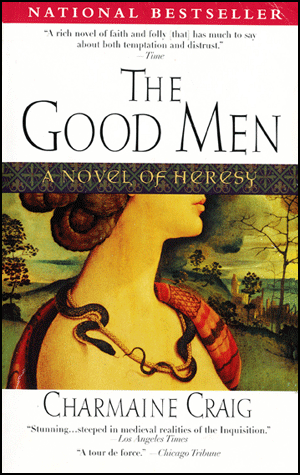“A tour de force.”
—Chicago Tribune
In fourteenth-century France, a young woman from the mountain village of Montaillou was tried for heresy by the Catholic inquisition. Her name was Grazida Lizier and, by her own confession, her “joy was shared” with the wrong man: the village rector.
“As a writer, she’s the real deal…The action takes place in Montaillou, a tiny mountain village that is falling under the influence of saintly wanderers known as the Good Men who preach that the world was created by the devil and should be despised. The narrative, which is based on historical sources, unfolds from several points of view: those of an alcoholic widow, a lustful village priest, a cobbler struggling with his homosexuality, a conflicted Inquisitor. Craig has the gift of finding complexity in simple people, and she tells their stories in fluid, shapely prose that blends mysteries both religious and erotic with the…realities of peasant life. She demonstrates powerfully that even those who escape the rack, by good luck or God's grace, can end up being broken by life in other ways.”—Time
“A lush, textured story about sex and abstinence, humanity and sainthood, men and women, celibacy and heresy that resonates as much in the twenty-first century as the fourteenth.”—Ellen Goodman, The Boston Globe
“Dazzling.”—Harper’s Bazaar
“Beautifully composed and darkly memorable . . . powerful.”—Harold Bloom
“The Roman Catholic Church kept transcripts of these inquisitional processes, providing an intimate, almost voyeuristic window into the affairs of men and women who lived seven centuries ago. These documents continue to fascinate…they provide inspiration for an ambitious first novel...There is much to admire in The Good Men, especially its deft juggling of complex intersecting story lines.” —The New York Times Book Review
“A rich tale of the struggle between spiritual thirst and bodily hunger… Craig deserves critical acclaim…for creating a novel that is not only highly readable, but one that forces her audience to squirm in the face of historical tragedy—and squirm we should.”—Fort Worth Star-Telegram
“Craig’s stunning first novel is redolent with time and place…absorbing.” —Los Angeles Times
“Grazida Lizier is a true heroine…There is something noble about the author’s full-fledged fictional re-creation of a woman who certainly deserves to be restored to history. Grazida belongs to the luminous minority of those who, absent formal education and in the darkest of ages, nevertheless insist on thinking for themselves.”—New York Newsday
“In her admirable novel, The Good Men, Charmaine Craig transports her readers to medieval France and the dark labyrinths of heresy. She offers no easy answers to the questions of faith and persecution but rather shows us passionate characters struggling with their own desires and dilemmas. This is a memorable and absorbing debut.”—Margot Livesey
“In her sensual imagining of the physical as well as the inner life of Grazida Lizier, Charmaine Craig has achieved a bold resurrection from the fourteenth century. She dramatizes the personal and catastrophic consequences of the calculated application of the machinery and cold passion of bureaucratic belief, the Inquisition’s attack on inquiry, the muting of a questioner’s voice. Lucky for fiction, Craig’s own voice is alive and well, knowing and musical.” —Geoffrey Wolff
“A fascinating story. It asks questions which are as relevant today as they were in the 14th century. Questions of sex and relationships, of religious faith, of women’s role in society all form the substance of this interesting and unusual novel.” —Edmonton Journal
“[An] elegant, richly detailed historical novel…[Craig] populates her book with an epic cast of characters, all of them yearning for salvation while trying to reconcile the 'recklessness of the flesh.'... Craig's novel addresses the powerful sense of dualism that has radically influenced the development of Western culture.” —Book Magazine
“Craig depicts [her characters]...with compassion and sympathy in this haunting, evocative and beautiful novel. Seldom have base human yearnings been dealt such an empathetic hand.”—Bellingham Herald
“Chronicling the uncertainties and ethical crises of a village rector in early 14th-century France who struggles as much with his bodily yearnings as with his spiritual needs, this heady novel draws on depositions given during the French Inquisition to fictionalize the strange story of the Cathars, a Christian sect of medieval southern France... a believable, poignant story based on themes of religious conviction and spiritual crisis. [Craig's] splendid use of imagery and fully fleshed out characters add depth to the novel, as do period details... [S]harp and satisfying.”—Publishers Weekly
